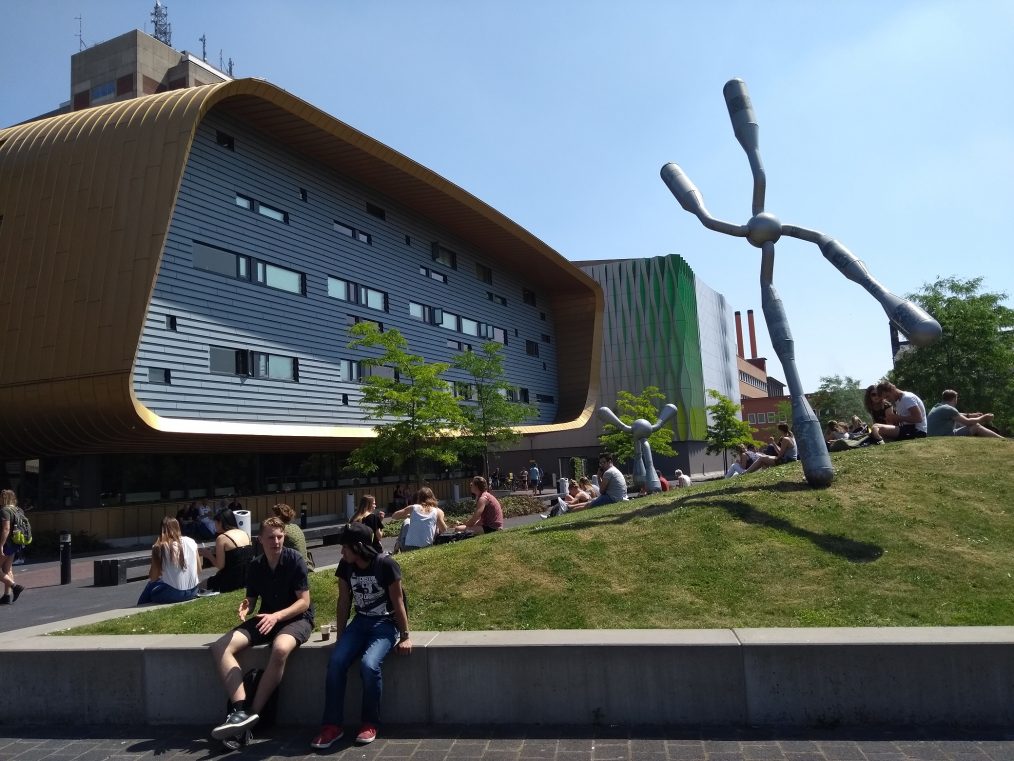
Psychological research in the UMCG: what is out there?
When you hear about students doing a Research Master in the University Medical Center Groningen (UMCG) after a Bachelor in Psychology, you probably would infer that these students totally changed their sides. But research at the hospital is not purely medical. Studying the psychological aspects of certain diseases is surprisingly commonplace and the expertise and perspectives gained from the Bachelor in Psychology is even urgently needed.
The integration of psychological aspects within medical research is particularly evident in the four research departments that are part of the research master in Clinical and Psychosocial Epidemiology: Epidemiology, Psychiatry, Health Psychology and Public Health.
We asked the four heads of each department: what is the department actually about? And what are the psychological aspects of your research?
by Fenja Kruse & Carel-Peter van Erpecum
Our first interview is with the Head of the Department of Epidemiology, Prof. Dr. Marike Boezen.
What topics are studied within this department?
‘In this department, the underlying idea is to study why some people get ill and others stay healthy. This happens within the context of common chronic diseases. Basically, what predicts a long and healthy life? In order to do this, we often use data from Lifelines, a three-generation longitudinal cohort study and biobank. It contains data on medical and mental health, as well as behavioral and genetic data.’
Does the department include specialized research units?
‘We have eight units: Chronic Airway Diseases Epidemiology, Health Behavior Epidemiology, Lifestyle Medicine in Obesity and Diabetes, Oncological Epidemiology, Medical Statistics and Decision Making, Digestive System Diseases, Genetic Epidemiology, Patient-Centered Health Technology Assessment, all led by (assistant/associate) professors. So, my unit, for example, focuses on chronic respiratory diseases. Some units look at etiology and determinants of diseases – the reasons why people get ill. They may also study the course of disease: how does the disease develop over time? There are also units focusing more on methodological issues, namely the Medical Statistics and Decision-making unit and the Patient-Centered Health Technology Assessment unit.
Our department is relatively large and has 130 people. These include several professors, PhD or CPE [Research Master in Clinical and Psychosocial Epidemiology] students. Our professors have an epidemiological, medical, or psychological background.
We have one annual social meeting in the Spring and a Summer day out for everybody in the department. Also, we have an epidemiological research meeting twice a month on a Thursday. This is for everybody who wants to become a senior registered Epidemiologist. CPE students are invited too. In these meetings we are always discussing two ongoing research projects within our department or clinical departments in the UMCG. Besides that, I think the department has a very open and friendly atmosphere.’
How does psychology feature within the research in this department?
‘There are units doing lifestyle interventions. There, you can see the obvious relevance of psychology. Furthermore, in all chronic diseases there is the issue of psychology in how patients deal with their disease. Another way would be to link genetics with psychological disorders. Even more, one could link psychological risk factors, personality, or how people deal with stress to the onset of diseases.’
How can students prepare themselves in case they are interested in this department?
‘Psychology students have an advantage in that they are trained well in methodology and statistics. Especially in this department, we typically adopt longitudinal designs with many participants and a wide range of variables. In order to make sense of these data, appropriate methodology is needed.
If you are a CPE student, you can approach one of the researchers to supervise your master thesis. Joining our research meetings will help with understanding what we do in this department.
In addition, you can take a look at our website. If you are interested in getting this extra epidemiology training you will find some information about it there. Students with a psychology background and no medical knowledge often do this training.’
Thank you for the information, prof. dr. Boezen!
In our next interview, we will explore psychological aspects in research from the department of Community and Occupational Medicine.
Below are some examples of publications that were based on research done by CPE students in the Department of Epidemiology. It shows the width of topics that can be studied in the Department of Epidemiology.
Bivariate genome-wide association analyses of the broad depression phenotype combined with major depressive disorder, bipolar disorder or schizophrenia reveal eight novel genetic loci for depression.
Amare, A. T., Vaez, A., Hsu, Y.-H., Direk, N., Kamali, Z., Howard, D. M., … Hartman, C. A. (2019). Molecular Psychiatry. https://doi.org/10.1038/s41380-018-0336-6
Social relationships and risk of dementia: A systematic review and meta-analysis of longitudinal cohort studies.
Kuiper, J. S., Zuidersma, M., Oude Voshaar, R. C., Zuidema, S. U., van den Heuvel, E. R., Stolk, R. P., & Smidt, N. (2015). Ageing Research Reviews, 22, 39–57. https://doi.org/https://doi.org/10.1016/j.arr.2015.04.006
Changing the obesogenic environment to improve cardiometabolic health in residential patients with a severe mental illness: cluster randomised controlled trial.
Looijmans, A., Stiekema, A. P. M., Bruggeman, R., van der Meer, L., Stolk, R. P., Schoevers, R. A., … Corpeleijn, E. (2017). The British Journal of Psychiatry : The Journal of Mental Science, 211(5), 296–303. https://doi.org/10.1192/bjp.bp.117.199315
Magnetic resonance imaging improves breast screening sensitivity in BRCA mutation carriers age >/= 50 years: evidence from an individual patient data meta-analysis.
Phi, X.-A., Houssami, N., Obdeijn, I.-M., Warner, E., Sardanelli, F., Leach, M. O., … de Bock, G. H. (2015). Journal of Clinical Oncology : Official Journal of the American Society of Clinical Oncology, 33(4), 349–356. https://doi.org/10.1200/JCO.2014.56.6232
Sex, smoking and body mass index: do they aid in uncovering the complex mechanisms behind airway hyperresponsiveness?
Teferra, A. A., Vonk, J. M., & Boezen, H. M. (2018). Expert Review of Respiratory Medicine, 12(12), 989–991. https://doi.org/10.1080/17476348.2018.1541741
Determinants of heart rate variability in the general population: The Lifelines Cohort Study.
Tegegne, B. S., Man, T., van Roon, A. M., Riese, H., & Snieder, H. (2018). Heart Rhythm, 15(10), 1552–1558. https://doi.org/https://doi.org/10.1016/j.hrthm.2018.05.006
Proven non-carriers in BRCA families have an earlier age of onset of breast cancer.
Vos, J. R., de Bock, G. H., Teixeira, N., van der Kolk, D. M., Jansen, L., Mourits, M. J. E., & Oosterwijk, J. C. (2013). European Journal of Cancer, 49(9), 2101–2106. https://doi.org/https://doi.org/10.1016/j.ejca.2013.02.018



